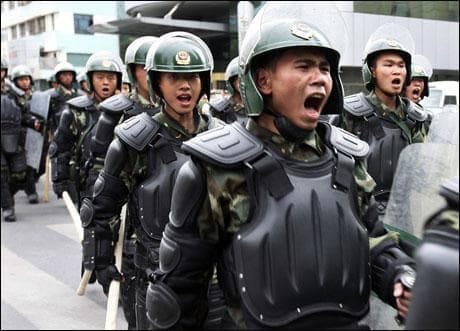Advertisement
China: Executions For Rioters Behind Killings

China flooded the capital of western Xinjiang province with security forces Wednesday after ethnic riots left at least 156 dead. The city's Communist Party boss promised those behind the killings would be executed.
Ethnic clashes have paralyzed Urumqi over the past several days — with minority Uighur and Han Chinese mobs roaming the streets and attacking each other. The violence forced President Hu Jintao to embarrassingly cut short a trip to Italy where he was take part in a Group of Eight summit.
Communist Party chief Li Zhi told a televised news conference that many people had been arrested, including students.
"To those who committed crimes with cruel means, we will execute them," he said, adding government forces would crack down on any security risk. He did not give details.
More than 1,100 people were wounded in the violence, and hundreds of vehicles were damaged or set on fire in the riots on Sunday. It was not known how many Uiqhurs and Han Chinese died or who was behind their deaths.
Li would not say how many of the 156 dead were Han — the majority ethnicity in China — and how many were Uiqhurs — a largely Muslim minority — even though more than 100 of them have been identified and handed over to their families.
He said both groups were responsible for the violence. "The small groups of the violent people have already been caught by police. The situation is now under control."
Earlier, helicopters dropped leaflets appealing for calm among Urumqi's 2.3 million residents, although the official Xinhua News Agency said there were "sporadic standoffs" between protesters and security forces, and some minor clashes. It did not give details.
Hu arrived home Wednesday "due to the situation" in Xinjiang, the official Xinhua News Agency said. It did not say what action he would take.
In some areas of Urumqi, residents formed alleyway barricades with furniture and debris to stop a repeat of the fighting between Uighurs (pronounced WEE-gers) and Han Chinese.
"The government told us today not to get involved in any kind of violence. They've been broadcasting this on the radio, and they even drove through neighborhoods with speakers telling people not to carry weapons," said one Han Chinese man who would give only his surname, Wang.
Hundreds of paramilitary police guarded the main roads to Uighur neighborhoods and the central square in Urumqi (pronounced uh-ROOM-chee), where the first riots began. Most were armed with shields and clubs, while a few had assault rifles fixed with bayonets.
Uighurs say the riots that started Sunday — put down by volleys of tear gas and a massive show of force — were triggered by the June 25 deaths of Uighur factory workers during a brawl in the southern Chinese city of Shaoguan. State-run media have said two workers died, but many Uighurs believe more were killed and said the incident was an example of how little the government cared about them.
This program aired on July 8, 2009. The audio for this program is not available.